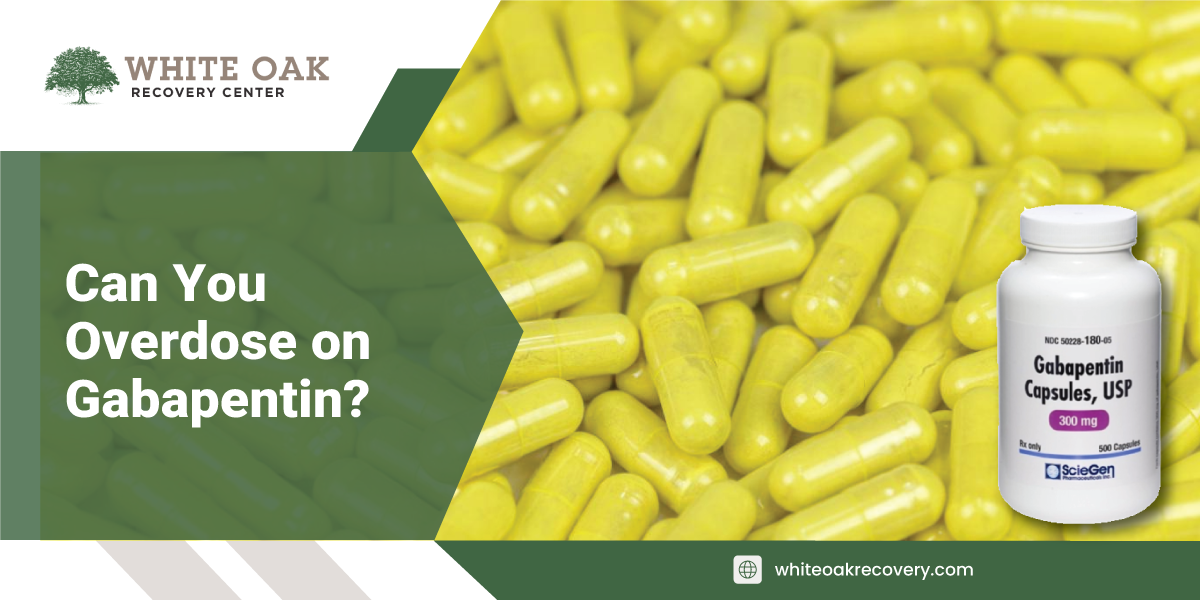Can You Overdose on Gabapentin?


Medical Writer:
Reviewer:

Johnny Kim
Executive Psychotherapist
Medical Writer:
Reviewer:

Johnny Kim
Executive Psychotherapist
Gabapentin is a prescription medication often used to treat nerve pain and restless leg syndrome. It has become more popular in recent years. However, with its increased use, there have been rising concerns about its potential for abuse and overdose. It is important to know the effects, side effects, and risks of gabapentin if you are taking it or thinking about taking it.
Table of Contents
Toggle
What Is Gabapentin?
Gabapentin is a prescribed drug mainly utilized for managing epilepsy, neuropathic discomfort, and restless leg syndrome. It affects the central nervous system, specifically inhibiting certain neurotransmitters to reduce seizures and alleviate nerve pain. Gabapentin is more readily available in the United States because it is not classified as a controlled substance. This sets it apart from other medications used for similar purposes.
However, this access also means that it is easier to misuse. When taken in high doses or mixed with other substances, gabapentin can have severe consequences. It can make you feel calm and stronger when combined with other substances, which has caused people to misuse it.
How Does Gabapentin Work?
It is not entirely understood how gabapentin works. It is structurally similar to the neurotransmitter gamma-aminobutyric acid (GABA) but does not bind to GABA receptors. Instead, it binds to the alpha-2-delta subunit of voltage-gated calcium channels in the central nervous system. This binding reduces the release of stimulating neurotransmitters, thereby reducing neurological excitability and providing therapeutic effects.
Side Effects of Gabapentin
Like all medications, gabapentin comes with a range of potential side effects. Common side effects include dizziness, fatigue, and coordination problems. Some people may also experience gastrointestinal issues such as nausea and vomiting. These side effects are usually mild and tend to resolve as the body adjusts to the medication.
In more severe cases, gabapentin can cause significant side effects, including:
- Severe dizziness or drowsiness
- Blurred or double vision
- Unusual changes in mood or behavior
- Swelling of the hands, feet, or legs
- Allergic reactions, including rash, itching, and difficulty breathing
It’s essential to consult with a medical professional if any severe side effects occur. Monitoring blood pressure and mental health is crucial while on gabapentin, as it can impact these areas significantly.
Long-Term Side Effects
Long-term use of gabapentin can lead to additional concerns. Chronic use may cause memory impairment, decreased libido, and weight gain. Some patients report experiencing persistent fatigue and muscle weakness. Additionally, long-term use can result in dependence, and stopping gabapentin use suddenly leads to withdrawal symptoms.

Gabapentin Abuse
Gabapentin abuse happens when people do not follow the doctor’s recommendations for taking the medication. This can include taking too much or taking it too frequently. Some people mix gabapentin with other drugs to make the high stronger and to feel good.
The abuse of gabapentin is a growing concern, particularly as it is often not detected in routine drug screens. This has made it a substance of choice for some people looking to circumvent drug testing procedures. Additionally, mixing gabapentin with other substances, especially depressants, can increase the likelihood of adverse effects and overdose.
Statistics and Trends
Recent studies and reports from poison control centers indicate that there has been a rise in gabapentin prescriptions. This increase in prescriptions has been associated with a higher rate of misuse of the drug.
Gabapentin is increasingly appearing in toxicology reports of people who have died from drug overdoses in the US. Doctors are finding this medication more frequently in the bodies of those who have overdosed on drugs. Many people who misuse opioids also use gabapentin, which can make the effects of these drugs stronger.
Gabapentin Withdrawal Symptoms
Suddenly stopping gabapentin can cause withdrawal symptoms, especially if taken for a long time or in high amounts. Withdrawal symptoms can include:
- Anxiety
- Agitation
- Insomnia
- Nausea and vomiting
- Sweating and chills
- Seizures
Before stopping gabapentin, it is important to talk to a healthcare provider to create a safe tapering plan. This approach helps to minimize withdrawal symptoms and ensures a smoother transition off the medication.
Managing Withdrawal
Managing gabapentin withdrawal involves a gradual reduction of the dosage under medical supervision. This tapering process can take several weeks to months, depending on the duration and dosage of gabapentin use. Supportive care, including hydration, nutrition, and monitoring of vital signs, is essential during this period. In some cases, medications may be prescribed to manage specific withdrawal symptoms, such as anxiety or seizures.
Psychological Support
Withdrawal from gabapentin can also have psychological effects. People may experience increased anxiety, depression, and irritability during the withdrawal process. Talking to a counselor or therapist can help with these problems. People can learn ways to deal with their symptoms.
Gabapentin Overdose
Gabapentin overdose is a severe and potentially life-threatening condition. Overdose can occur if someone accidentally takes a double dose of gabapentin or mixes it with other substances at the same time. Symptoms of gabapentin overdose include:
- Severe drowsiness and sedation
- Slurred speech
- Unresponsiveness or coma
- Seizures
- Rapid heart rate
- Low blood pressure
If you suspect someone has taken a toxic dose, you must call 911 and seek emergency medical attention immediately. Gabapentin overdose management typically involves supportive care to stabilize the patient, including monitoring vital signs and administering medications to reverse the effects if necessary.
Prevention of Gabapentin Overdose
Preventing gabapentin overdose involves educating patients on the correct dosage and the dangers of mixing gabapentin with other substances. Healthcare providers should emphasize the importance of following the prescribed dosage and not adjusting it without medical advice. Patients should know the dangers of drinking alcohol or using other depressants while taking gabapentin.

Treating Gabapentin Addiction
Treating gabapentin addiction requires a comprehensive approach that addresses both the physical and psychological aspects of addiction. Treatment options may include:
- Medical Detox: The first step in treating gabapentin addiction. It involves supervised withdrawal to remove the drug from the person’s system safely.
- Counseling and Therapy: Behavioral therapies and counseling are essential to address the underlying issues contributing to substance use disorder and to develop coping strategies.
- Medication-Assisted Treatment (MAT): In some cases, medications may be used to help manage withdrawal symptoms and reduce cravings.
- Support Groups: Joining support groups can provide a sense of community and ongoing support, which is crucial for long-term recovery.
Gabapentin addiction treatment should be tailored to the individual’s needs, and it is important to work with medical professionals experienced in substance use disorders to develop an effective treatment plan.
Why Is the Integrated Treatment Approach Important?
A mix of medical, psychological, and social help is best for treating gabapentin addiction. This approach involves a team of healthcare providers working together to give complete care.
The team includes doctors, psychiatrists, therapists, and social workers. They collaborate to provide comprehensive care to patients. Each team member contributes their expertise to meet the patient’s needs.
Gabapentin Rehab at White Oak Recovery Center
Gabapentin can help with medical issues but may have side effects. It can be abused or lead to an overdose. Understanding these risks and using gabapentin responsibly under the guidance of a healthcare provider can help mitigate potential dangers.
If you or a loved one is struggling with gabapentin addiction or another opioid addiction, White Oak Recovery Center (WORC) can provide integrated, evidence-based, and compassionate substance abuse treatment.
WORC’s licensed and accredited inpatient facility provides custom treatment plans with medical detox, medication-assisted treatment, dual diagnosis treatment, and many therapies to support these intensive treatment programs.
Reach out today to speak with one of our caring treatment specialists to discuss your unique path to recovery. Reclaiming your life from addiction may be a phone call away.

Am I covered for addiction treatment?
Your insurance may cover treatment. Call now for an entirely free and confidential assessment. Recovery starts with a phone call.

- Mattson, Christine L., et al., “Notes from the Field: Trends in Gabapentin Detection and Involvement in Drug Overdose Deaths – 23 States and the District of Columbia, 2019-2020.” Centers for Disease Control and Prevention, May 2022.
- Middleton, Owen, “Suicide by Gabapentin Overdose.” J Forensic Science, May 2011.
- Klein-Schwatrz, Wendy, et al., “Characterization of Gabapentin Overdose Using a Poison Center Case Series.” J Toxicol Clin Toxicol., 2003.
- Yasaei, Rama, et al., “Gabapentin.” StatPearls: National Library of Medicine, Feb. 2024.
- Hung, T.Y., et al., “Gabapentin Toxicity: An Important Cause of Altered Consciousness in Patient with Uraemia.” BMJ Case Reports, May 2009.
- Lennox, Robin, and Mangin, Dee, “Gabapentin Misuse.” Canadian Medical Association Journal, Jan. 2019.
- Smith, Rachel V., et al., “Gabapentin Misuse, Abuse, and Diversion: A Systematic Review.” Addiction, Jul. 2016.
Medical Disclaimer:







